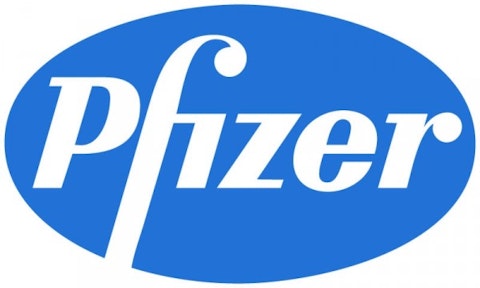Pfizer Inc. (NYSE:PFE) recently completed the spin-off of its animal health unit, Zoetis Inc (NYSE:ZTS). The company offered to acquire its stake in Zoetis for a 7% discount, in exchange of all or part of its shareholding. This is subject to an upper limit of 0.9898 shares of Zoetis common stock per share of Pfizer Inc. (NYSE:PFE) common stock. This spin-off is expected to reflect on Pfizer Inc. (NYSE:PFE)’s EPS beginning 2014. Before Zoetis Inc (NYSE:ZTS)’ IPO in February, Pfizer held nearly 401 million class B shares of Zoetis, which it now aims to convert to Class A shares of the animal health company.
This spin-off follows Abbott Laboratories (NYSE:ABT), which spun-off AbbVie Inc (NYSE:ABBV) on New Year’s Day. This is indeed becoming a common practice, with analysts predicting more spin-offs in the industry.
Why spin-offs?
The pharma industry is one of the riskiest. Actually, I cannot think of a riskier industry than pharmaceuticals.
The main risk in investing in the pharmaceutical industry is the high spending associated with research and development against uncertain results of products developed. Competition is also heating up in the industry, with some of the rivals actually opting to acquire the underdogs, a good case example being AstraZeneca plc (ADR) (NYSE:AZN)’s acquisition of Omthera Pharmaceuticals.
Concentration seems to be the main reason for the spin-offs, as it would allow the companies to focus on developing products within their main lines of business. For instance, Pfizer Inc. (NYSE:PFE) can now focus on its biopharmaceuticals products by directing its research and efforts at the products currently in its pipeline. Ian Read, Pfizer Chairman and Chief Executive Officer said:
“We expect that this exchange offer will continue to deliver value to Pfizer Inc. (NYSE:PFE) shareholders by reducing the number of our outstanding shares in a tax-efficient manner. At the same time, we believe that this transaction better positions Pfizer to focus on our core business as an innovative biopharmaceutical company.”
According to the company’s most recent update, as of May 9, there are 74 products in the pipeline, 18 of them in phase three and 6 in registration. This compares flatly to the company’s previous update on Feb. 28, 2013, which revealed 17 products in stage three and seven in registration.
With specialization, Pfizer will be able to come up with numerous biopharmaceutical products for human health. Pfizer will also be cutting its payroll budget by about 1,000 employees, which should ease running costs. However, it will also be spinning-off some $4 worth of annual revenue from the unit, which could result in reduced gross margins. However, the EPS is bound to improve if majority of the shareholders take Pfizer’s offer.
By exchanging their shareholding in Pfizer to own, a stake in Zoetis will result in some sort of share buyback for the pharmaceutical giant. Therefore, this spin-off is not only resulting in long-term benefits associated with specialization, but also some near-term benefits in form of stock repurchases.
On the other hand, Zoetis Inc (NYSE:ZTS) is now an independent company, able to develop its own strategic plans with regards to animal health. In 2012, Pfizer invested $400 million in R&D on the animal health unit, but now, Zoetis plans to invest about $385 million to $415 million in 2013. Zoetis is well set to stand on its own and certainly needs no helping hand from Pfizer.
The Kalamazoo, MI-based company has a 60 year-old history with Pfizer, with 29 manufacturing plants located in its Michigan base. It also has other plants in California, Iowa, Maryland, Missouri, Nebraska, North Carolina, and New Jersey, which also houses its headquarters.
Both Pfizer Inc. (NYSE:PFE) and Zoetis shares have fluctuated during the transition period, depicting a relative rally since February. It seems as if the $2.2 billion Zoetis IPO triggered the rally. Both companies had significant rallies, with shares of Zoetis rising from the offer price of $26 to $34. However, the shares are now down to $31, and continue to fluctuate. On the other hand, shares of Pfizer rallied from $27.70 in Feb, up to around $31 in April, before sliding to $28.26 as of June 7.
However, the best example to highlight the impact of a spin-off is the Abbott-AbbVie split, which saw the shares of the spun-off unit rise from $35 in January to the current $44, as of June 7.
So, why did AstraZeneca acquire Omthera Pharmaceuticals when others are spinning-off?
AstraZeneca plc (ADR) (NYSE:AZN)’s acquisition of Omthera is a strategic buy which focuses on capitalizing on the rapidly growing demand for fish oil products, especially the ones rich in omega 3. Fish oils are becoming a critical ingredient in the treatment of cardiovascular diseases, which makes this acquisition different from the previous spin-offs as noted above.
The units spun-off by Abbott and Pfizer Inc. (NYSE:PFE) do not offer the kind of opportunity offered by Omthera. Additionally, Zoetis’ business is completely different from Pfizer’s core business. On the other hand, Omthera’s products are quite in line with AstraZeneca plc (ADR) (NYSE:AZN)’s business, only that the ingredients come from a unique host.
Pricing
Pfizer’s most recent quarterly earnings grew 53.3%. It currently trades at 13.53 times earnings ratio, which is favorable when compared to Zoetis’ 33.87x. However, it is good that both companies now operate in different industries. The only sense in this comparison is because shareholders of Pfizer are swapping part of their holdings with a stake in Zoetis. This means that they are expensively priced, and the so-called discount may not be effective after all.
On the other hand, Abbott Laboratories reported 56.2% decline in earnings from its most recent quarter compared to AbbVie’s 9.6% rise. However, the giant pharma is cheaply valued compared to its spun-off unit. Abbott trades at 11.43 times trailing earnings while AbbVie trades at 13.1x.
The bottom line
Pfizer Inc. (NYSE:PFE)’s fundamentals are still very strong despite spinning off a profitable unit. Therefore, the decision to spin-off Zoetis could only mean one thing. The company wanted to concentrate on its core business, bio-pharmaceuticals, as correctly pointed out by the CEO. This is bound to improve the company’s progress in coming up with innovative bio-pharmaceutical products, which could result in huge upside in the long-term.
On the other hand, Zoetis seems to have a very strong foundation, and can as well focus on developing innovative animal health products, without having to care what happens to Pfizer. The pharma industry is increasingly pushing diversified companies to spinning-off their slowing units, or units that do not seem to result in synergy benefits. Pfizer’s move is a clever one, and a necessary one.
The article Is Concentration Better Than Diversification in Pharma? originally appeared on Fool.com and is written by Nicholas Kitonyi.
Nicholas Kitonyi has no position in any stocks mentioned. The Motley Fool has no position in any of the stocks mentioned. Nicholas is a member of The Motley Fool Blog Network — entries represent the personal opinion of the blogger and are not formally edited.
Copyright © 1995 – 2013 The Motley Fool, LLC. All rights reserved. The Motley Fool has a disclosure policy.





